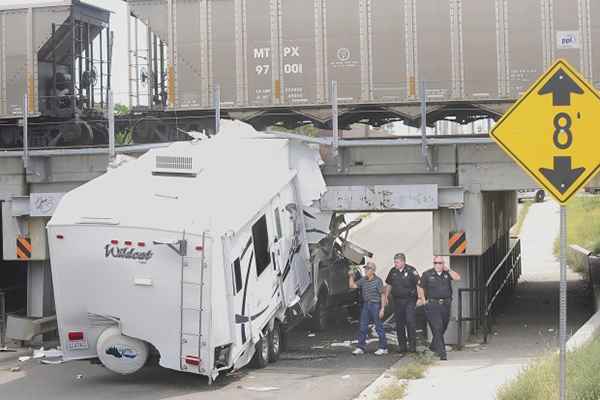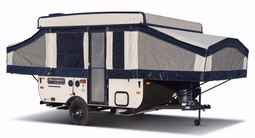
How Much Is Travel Trailer Insurance (Lower Average Cost)
Having a home on wheels away from home is thrilling. Every day a new location, new people, and new sights. However, having a travel trailer, an RV, or a camper comes with some responsibilities.
If you’re an owner of a travel trailer or you are just renting one, insurance is something that should be your top priority. Ensuring your travel trailer is just as important as ensuring your house and car. It will give you a piece of mind. However, ensuring your travel trailer can be somewhat tricky. Camping trailer insurance rates vary based on the type of trailer and the type of insurance. Liability and collision insurances are a must, but you also have to think about theft and damage insurances.
Now, the first logical question is “how much is travel trailer insurance?” Depending on the type of your travel trailer, the cost to ensure a travel trailer varies.
Average Cost to Ensure a Travel Trailer

Travel trailer insurance rates can be anywhere between $170 and $1400. The prices vary and depend on many factors — the size of the trailer, the state the trailer is registered in, how often you use the trailer, and how often it’s on the road.
Therefore, those who only use their travel trailers for vacations a couple of weeks a year won’t pay as much as those who genuinely use their trailers as homes away from home. Of course, owner’s driving record, as well as the value of the contents inside the trailer, all affect the average price for RV insurance.
Popup Camper Insurance Cost
If you paid for your popup camper on the spot or bought it used, you probably don’t have insurance. What’s more, you’re also wondering if you even need insurance on a popup camper. The answer is yes.
However, camper insurance cost varies based on several factors:
- the overall value of the camper
- the dimensions — the height and the width
- how often you use the camper
- how you store the camper when you’re not using it
If you’re lucky, you might be able to add the popup camper to your current auto or home insurance policy. However, in some cases, you might need to purchase the insurance individually. Nonetheless, you should make sure that your insurance covers:
- liability
- collision
- comprehensive damage (theft, weather damage, etc.)
Travel trailer insurance cost for popup campers can be as low as $125. What’s more, popup camper owners usually add their trailers to their existing auto insurance. That’s relatively inexpensive, and it includes the collision and liability coverage. Meanwhile, you can also get theft coverage under their homeowner insurance.
Do You Have to Have Insurance On a Travel Trailer

A simple answer to the question “do travel trailers need insurance?” is — yes. Here are a few reasons why.
Wrapping your head around the travel trailer coverage might be difficult. You already have auto insurance, and your car is towing the travel trailer, so that should be enough, right? No, it isn’t. Your auto insurance policy will extend to your travel trailer but only when it comes to liability. That means there’s no actual coverage for the travel trailer. If you cause damage to other people and their property — the insurance agency will cover the cost. However, when it comes to the damage done to your trailer, you’re on your own.
Therefore, you need better coverage. It’s best to go with an insurance policy that includes physical coverage as well.
Does a Tent Trailer Need Insurance

While tent trailer insurance isn’t obligatory or required by law, we strongly recommend it. As mentioned, you need to protect your property (in this case, your trailer) from any potential damages on the road.
Insurance will give you a piece of mind. Tent trailers are easy to damage — you might get hit while parked, or it might suffer damages from severe weather.
What States Require Travel Trailer Insurance
Minimum liability coverage is required in all the states in the USA. There’s a bare minimum you have to pay, no matter where you’re registered or where you intend to go.
Furthermore, some states require travel trailer owners to have uninsured/underinsured coverage. That means that you might have to pay extra and add a clause to your insurance policy. This will prove very useful if you cause any bodily harm or property damages to underinsured or uninsured drivers. In those cases, the injured or damaged party will get compensation above the limit of your insurance policy.
Does My Auto Insurance Cover My Travel Trailer
In short, the answer is — yes. However, your auto insurance policy covers your travel trailer only while it’s attached to your vehicle. As soon as you unhook the trailer from your car, the insurance is no longer applicable.
That means that your travel trailer is only insured while you’re driving. If you stop and unhook your trailer to go fishing, and a bolt of lightning hits it — you have no insurance and will have to cover the damages on your own.
The way around this is to purchase an insurance policy that’s specific to your travel trailer.
How Does Travel Trailer Insurance Work
Travel trailer insurance means that you are covered at all times, even when you detach your trailer from your car. What’s more, travel trailer insurance covers a lot of potential worst case scenarios.
An insurance policy for your travel trailer will make sure you are compensated for some or all your losses. If your trailer gets damaged or destroyed by other drivers or natural disasters, or if it gets stolen, you can file a claim with your insurance agency and get compensated for the damage.
What Does Travel Trailer Insurance Cover
While you can choose the type of insurance policy you want, there are some requirements when it comes to travel trailer insurance. Your policy depends on the type and size of your trailer, as well as how often you use it and for what purposes.
Typically, travel trailer insurance covers:
- liability
- collision
- comprehensive damage
It might seem unusual to have liability coverage, given that your travel trailer has no motor, and you can’t actually drive it. However, travel trailers have been known to unhook from the towing vehicles and cause extensive damage on the road. Therefore, liability coverage is essential.
Collision coverage ensures compensation in case of any damages from accidents. Meanwhile, the comprehensive damage coverage ensures you for damages done by harsh weather conditions like natural disasters. Furthermore, it will also ensure you against theft and vandalism.
You can also get commercial trailer insurance. This is a requirement for all those who use travel trailers for business purposes. For example, auto haulers, concession trailers, dump body and transfer boxes, etc. all need commercial travel trailer insurance.
What Should be Included
Typically, travel trailer insurance should include all mentioned above. Standard travel trailer insurance should cover the following:
- Collision coverage
- Property damage that’s limited to your travel trailer
- Protection in case of personal injuries to you or others
- Comprehensive damages like theft and natural disasters
- Uninsured or underinsured motorist coverage
- Property protection
However, if you’re looking to protect your travel trailer further, you can choose one of the many options of specialized coverage. Specialized coverage will ensure any custom equipment you may have, as well as personal effects. Furthermore, it will also cover total loss replacement, roadside assistance, and vacation liability.
Does Travel Trailer Insurance Cover Water Damage
Given that standard insurance policies don’t include regular wear and tear that also means they don’t cover water damage. Water damage is usually caused by natural aging of your travel trailer will not be compensated by your insurance agency.
If the water damage is a side effect of comprehensive damages, though, your insurance policy will cover it. However, a leaky roof caused by a bit of rust isn’t something you can claim to your insurance agency.
Travel Trailer Insurance Requirements

When it comes to travel trailer insurance requirements, the difference is clear. If you tow your travel trailer, the insurance is optional, and you are covered on the road under your auto insurance policy. However, if your travel trailer can get from one place to another without the towing (if you can drive it), then the insurance is obligatory.
All vehicles have to have insurance when on the road. Therefore, travel trailers are no exceptions. Every state requires at least a minimum liability coverage for travel trailers on the road.
Where to Get Travel Trailer Insurance
There are plenty of agencies out there that offer travel trailer insurance and RV insurance. Before making any decisions, make sure to check several of them out. However, many travel trailer owners are unsure if the agency is giving them a good deal or not. That’s especially true for first-time owners.
If you’re unsure whether you should get an insurance policy with an agency or not, then make sure you check out all your options. We suggest comparing different agencies and their quotes.
You don’t have to run around town to do this. You can use online apps and websites that compare insurance companies and their quotes and see if your agent was telling you the truth when they said their agency is the most affordable. Websites like RVLifestyleExperts.com and RV America Insurance compare agencies and the travel trailer insurance cost estimate for you.
Is Travel Trailer Insurance Worth It
Travel trailer insurance is definitely worth it. When you’re on the road or camping with your friends and family, you don’t think about potential disasters that might strike. Of course not, that’s no way to live. What’s more, drivers who are constantly scared something might happen on the road are a liability. Therefore, you should always focus on driving instead of dwelling on the impending doom as nervous drivers often do.
However, that doesn’t mean that you should act as though nothing will happen. In 2015 alone, there were 6.3 million car-related accidents in the USA. Therefore, while you aren’t obligated to ensure your travel trailer if you’re towing it, in light of these statistics, it would be a wise decision.
Not to mention, accidents and damages done in other ways put your property at great financial risk. Many travel trailer owners don’t have enough financial strength to compensate even minor damages, let alone a total loss. If you’ve paid between ten and twenty thousand for your travel trailer, paying $900 a year to ensure it isn’t that steep of a price.
Travel Trailer Insurance Companies
As mentioned before, there are many insurance companies you can turn to for travel trailer insurance. They will give you camping trailer insurance rates and the travel trailer insurance cost estimate. That way, you’ll be able to make an educated decision and purchase a policy that has the best money to value ratio.
Some of the companies we would recommend are:
- Good Sam Insurance Agency
- RV Insurance
- National General Insurance
- Progressive Insurance
- RV America Insurance
- Geico Insurance
- Blue Sky Insurance
These are the agencies voted as top insurance agencies in 2018. Many of them offer online quotes, so you’ll be able to check them out without pesky calls from their sales departments.
The Best Insurance for Camper Trailers
The best insurance for travel trailers will keep you safe from liability, collision, and comprehensive damages. However, many agencies are known to throw in a couple of bonuses in insurance policies.
Some of the agencies we’ve mentioned offer clauses in their policies for full-time campers, for example. On the other hand, if you are a first-time camper, you can find a great deal with discounts for new owners.
How Much is RV Insurance in California

Travel trailer insurance average cost varies from state to state. For example, it makes a great difference whether you live in North Carolina or in Michigan, at least when it comes to camping trailer insurance rates and the average cost of RV insurance.
North Carolina has the lowest RV insurance rates — $860 per year. That comes up to $71.66 per month. However, the state of Michigan, on the other hand, has much higher average prices — $4490 per year, which comes around $374.16 per month.
When it comes to the state of California, it falls somewhere in the middle. In California, you’ll have to set aside between $800 and $4000 a year for RV insurance. Of course, the more luxurious the vehicle you own, the steeper the price. But the average is still not as high as in Michigan.
RV insurance rates will depend on many factors in all states, not just in California. The type of the RV, make, model, and the year of manufacturing will play a significant role when it comes to the travel trailer insurance rate estimate. Furthermore, how often you use your RV and your driving record can lower or increase your rates.
RV Insurance Cost in Florida
When it comes to RV insurance in Florida, it’s a bit different than in some other states. Mainly because Florida has very low minimum liability standards. In fact, they are the lowest in the entire country. Therefore, you might need to pay for additional coverage. RV accidents and damages can be very costly. The low minimum in Florida will not be able to cover it.
For RVs, Florida has strict insurance requirements. For accidents that include one person and for accidents that involve property damage, minimum liability insurance requirement is $10,000. Meanwhile, the minimum is $20,000 for accidents that involve more people.
Tips to Lower Your Trailer Insurance
There are some ways to deduct the costs of your travel trailer insurance. You can save money and pay a lesser monthly fee if you employ some of these strategies.
Combining Policies
One of the ways to save money on your travel trailer insurance is to combine policies. You probably already have an auto insurance policy and a homeowner insurance policy. You can combine them. What’s more, many agencies offer a multi-policies discount. So if you get two or more policies with one agency, you might get a hefty discount.
For example, consider getting your travel trailer insurance and travel insurance or auto insurance at the same company, and ask for a discount.
Quote Online
This is a simple yet effective way to save money. When you ask for quotes online, you avoid the salespeople on the phone. While they can be helpful, more often than not, they will try to get you to agree to a higher premium or additional features.
What’s more, getting quotes online is less complicated than getting them over the phone or in person. It gives you more time to think about what the most effective option might be. Furthermore, everything is transparent, and you can even customize your quote. If it’s crucial to you to get coverage only for the things you need and nothing more — online quotes are the way to go.
Keep a Good Credit Score
Your credit score is essential for travel trailer insurance. Just like with your auto insurance, the agency will ask for your credit score. That way, they measure your ability to pay back a loan. However, that isn’t the only thing that interests them.
Credit scores also tell them what the odds of you filing a claim are. Therefore, don’t be surprised if your rates are higher than you expect. Even if you’ve never had any accidents, that might be due to your bad credit score.
Some agencies offer employer discounts on business travel trailers. This is another handy way to save some money on your insurance policy. However, keep in mind that some agencies only offer discounts if the employer is contributing and paying at least a portion of the premium. What’s more, there are agencies that offer discounts only if the employer pays the entire premium.
Increase The Deductibles
When you raise your deductible, you’ll lower the premiums. The relationship between deductibles and the premiums is something to keep an eye out for. When you pay in on any claims that need to be paid out, that will have a positive effect on your premiums.
We hope we’ve managed to answer your question — how much is travel trailer insurance? On average, travel trailer insurance varies not only by state but based on many other factors as well. If you’re thinking of purchasing a travel trailer, then this is something you definitely need to consider.

